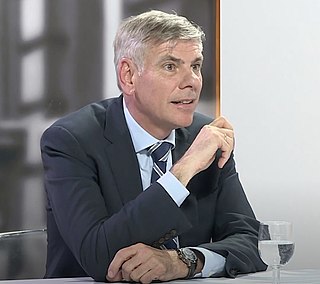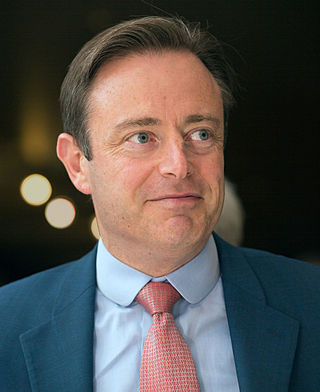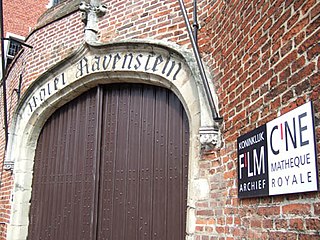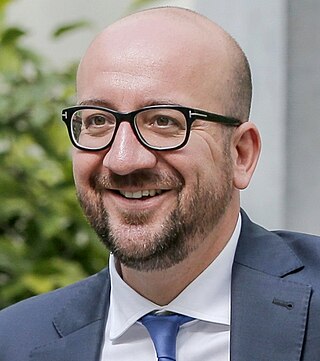Related Research Articles

Voeren is a Flemish Dutch-speaking municipality with facilities for the French-speaking minority, located in the Belgian province of Limburg. Bordering the Netherlands to the north and the Wallonia region's Liège Province to the south, it is geographically detached from the rest of Flanders, making Voeren an exclave of Flanders. Voeren's name is derived from that of a small right-bank tributary of the Meuse, the Voer, which flows through the municipality.

Le Soir is a French-language Belgian daily newspaper. Founded in 1887 by Emile Rossel, it was intended as a politically independent source of news. Together with La Libre Belgique, it is one of the country's most popular Francophone newspapers in both Brussels and Wallonia, and since 2005 has been published in Berliner format. It is owned by Rossel & Cie, which also owns several Belgian news outlets, as well as the French paper La Voix du Nord.

Philip Michel Frans "Filip" Dewinter is a Belgian politician, journalist and commentator. He is one of the leading members of Vlaams Belang, a right-wing Flemish nationalist and secessionist political party.
Operation Vigilant Guardian was a Belgian army operation following the January 2015 Île-de-France attacks and the dismantling of a terrorist cell in Verviers having foiled attacks imminent, to deal with the terrorist threat and protect the "points" sensitive territory. The operation was put in place 16 January 2015 and ended on 1 April 2021.
The Belgian Holocaust denial law, passed on 23 March 1995, bans public Holocaust denial. Specifically, the law makes it illegal to publicly "deny, play down, justify or approve of the genocide committed by the German National Socialist regime during the Second World War". Prosecution is led by the Belgian Centre for Equal Opportunities. The offense is punishable by imprisonment of up to one year and fines of up to 2,500 EUR.
The Belgian stay-behind network, colloquially called "Gladio", was a secret mixed civilian and military unit, trained to form a resistance movement in the event of a Soviet invasion and part of a network of similar organizations in North Atlantic Treaty Organization states. It functioned from at least 1951 until 1990, when the Belgian branch was promptly and officially dissolved after its existence became publicly known following revelations concerning the Italian branch of the stay-behind network.

The Kingdom of Belgium has three official languages: Dutch (Flemish), French, and German.
The partition of Belgium is a hypothetical situation, which has been discussed by both Belgian and international media, envisioning a split of Belgium along linguistic divisions, with the Flemish Community (Flanders) and the French-speaking Community (Wallonia) becoming independent states. Alternatively, it is hypothesized that Flanders could join the Netherlands and Wallonia could join France or Luxembourg.

Bart Albert Liliane De Wever is a Belgian politician. Since 2004, De Wever has been the leader of the New Flemish Alliance (N-VA), a political party advocating for the independence of Flanders. He is also a member of the Chamber of Representatives. De Wever played a prominent role in the 2007 Belgian government formation and presided over his party's victory in the 2010 federal elections when N-VA became the largest party in both Flanders and in Belgium as a whole.

The People's Party, abbreviated to PP, was a political party in Belgium. Primarily a French-speaking party, it considered itself to be to the right of the Reformist Movement, the main centre-right party in Francophone Belgium. It was often considered as a right-wing populist party. From 2016 onwards, it was considered as far-right by the Centre de recherche et d'information socio-politiques.
The André Cavens Award is an accolade presented annually by the Belgian Film Critics Association (UCC), an organization of film critics from publications based in Brussels. The André Cavens Award was introduced in 1976 by the organizing committee to honor cinematic achievement in Belgium. The name of the award comes from film director André Cavens.
Louvain Coopération is a Belgian International non-governmental organization (INGO) located in the university city of Louvain-la-Neuve. This organization is a member of the Federation of Development Cooperation NGO (Acodev). The NGO was founded by members of the University of Louvain (UCLouvain) and is an important part of the Belgian universities NGO grouping (Uni4coop), It operates on an annual budgetary basis of around €8 million, and is active in about 40 projects distributed in nine countries of the world, if you count Belgium. Its fields of activity are: health, including mental health and in specific gender-related contexts, food security, microeconomy, mutual organization and international solidarity.

CINEMATEK is a film archive in Brussels, Belgium.

During World War II, Belgian prisoners of war were principally Belgian soldiers captured by the Germans during and shortly after the Battle of Belgium in May 1940.

The Michel I Government was the Federal Government of Belgium formed following the 2014 Belgian government formation and sworn in on 11 October 2014. The administration was a centre-right coalition of the New Flemish Alliance (N-VA), the Christian Democratic and Flemish (CD&V), the Open Flemish Liberals and Democrats and the Reformist Movement (MR). The prime minister was Charles Michel. The government had an agenda of socio-economic reforms, especially through austerity measures, with its priorities being improving Belgium's economic competitiveness and reducing unemployment. It fell in December 2018 over the Global Compact for Migration.

On 15 January 2015, Belgian police carried out a raid on premises in Verviers, Belgium. According to news sources, the raids were an anti-terrorist operation against Islamist radicals.
André Adam was a Belgian-French diplomat. His postings during his lengthy diplomatic career included Consul General of Belgium in Los Angeles (1982–1986), Ambassador to Algeria (1986–1990), Ambassador to Zaire (1990–1991), Ambassador to the United States (1994–1998), and Permanent Representative to the United Nations (1998–2001). He was killed in the double suicide bombing at Brussels Airport on 22 March 2016.

On 6 August 2016, a man attacked two policewomen with a machete in Charleroi, Belgium, before being shot dead by another police officer.
Christian B.S. Van Eyken is a former Belgian politician who represented the Union des Francophones in the Flemish Parliament from 1995 to 2019. He was convicted of murder in 2019, with the court of appeal upholding the verdict in 2021.

Disney Channel is the Belgian edition based on the American channel of the same name, owned by the Walt Disney Company.
References
- ↑ "De nouvelles découvertes" (in French). La Libre Belgique. 2006-09-08.
- ↑ "Mandats d'arrêts confirmés pour les néo-nazis" (in French). Le Soir. 2006-09-13. Archived from the original on 2007-03-12.
- ↑ "Un 'terror game' avant les attentats" (in French). Le Soir. 2006-09-12. p. 6.
- ↑ "Un groupe terroriste néonazi démantelé" (in French). Le Nouvel Observateur. 2006-09-08.[ permanent dead link ]
- ↑ "La Belgique démantèle un groupe néonazi préparant des attentats" (in French). Le Monde. 2006-09-07. Archived from the original on 2012-06-04. Retrieved 2006-09-13.
- ↑ "Des militaires néonazis voulaient commettre des attentats" (in French). RTL Belgique. 2006-09-08.
- ↑ "Des militaires néonazis voulaient déstabiliser la Belgique par des attentats" (in French). AFP. 2006-09-08.[ permanent dead link ]
- ↑ "La Belgique découvre, stupéfaite, un complot néonazi au sein de son armée" (in French). AFP. 2006-09-08.[ permanent dead link ]
- ↑ "Un réseau terroriste de militaires néonazis démantelé en Belgique" (in French). Le Monde. 2006-09-08. Archived from the original on 2008-01-11. Retrieved 2006-09-13.
- ↑ "Belgium police hold 17 in 'plot'". BBC News . 2006-09-07.
- ↑ (in Dutch) Inlichtingendiensten staan op scherp door de dreiging van extreem rechts Archived 2012-04-02 at the Wayback Machine , De Telegraaf, 30 September 2006
- ↑ "La justice dément les propos de VTM" (in French). Le Soir. 2006-09-13.
- ↑ "Un arrière-goût d'années de plomb" (in French). La Libre Belgique. 2006-09-08.
- ↑ "Les néonazis voulaient déstabiliser le pays" (in French). Le Soir. 2006-09-07. Archived from the original on 2006-10-14.